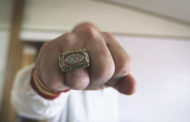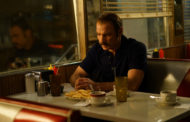 There are few directors in history who were so gifted that they made one masterpiece film after another. One of those directors was the legendary Sergio Leone, who is best known for directing the iconic westerns A Fistful of Dollars, For a Few Dollars More, The Good The Bad and The Ugly, and Once Upon a Time in the West. He’s also one of the few directors whose movies seem to get better with length — the more footage that is added to them by restoration, the more brilliant they are.
There are few directors in history who were so gifted that they made one masterpiece film after another. One of those directors was the legendary Sergio Leone, who is best known for directing the iconic westerns A Fistful of Dollars, For a Few Dollars More, The Good The Bad and The Ugly, and Once Upon a Time in the West. He’s also one of the few directors whose movies seem to get better with length — the more footage that is added to them by restoration, the more brilliant they are.
Equally brilliant is Leone’s final movie, the 1984 gangster epic Once Upon a Time in America. Unfortunately, the movie was butchered in its initial release, cut from 269 minutes (4 hours and 29 minutes) to 229 minutes (3 hours and 49 minutes) for its European release, then completely reedited and cut down to 139 minutes (2 hours and 19 minutes) for its U.S. release. While the 229 minute was subsequently released in the United States (and is available on DVD and Blu-ray), the additional forty minutes cut from it when it premiered at the 1984 Cannes Film Festival was thought to be lost.
However, the Film Society of Lincoln Center announced today that it will celebrate the movie’s 30th anniversary by exhibiting a 251 minute version of Once Upon a Time in America at the 2014 New York Film Festival later this year. The press release says this about the restoration:
Sergio Leone’s final and perhaps greatest film, Once Upon a Time in America is a New York gangster saga housed within an intricate temporal construction that shuttles between eras, plunging the characters and the viewer into an ocean of longing, regret, and rumination over what might have been. Robert De Niro and James Woods star as boyhood friends from the Lower East Side who build a bootlegging empire. Elizabeth McGovern appears as the woman of their dreams (played as a girl by Jennifer Connelly). When this film was originally released in the United States, it was edited down to size and put in chronological order. It was followed by a re-release in a much longer cut that preserved the director’s structure. This version includes 22-minutes of restored footage, never before seen in the United States. The restored footage has been returned to the film three decades after its theatrical release, deepening the characters and enlarging the work of its astonishing cast: Robert De Niro, James Woods, Tuesday Weld, Joe Pesci, Jennifer Connelly, Elizabeth McGovern, Treat Williams and Louise Fletcher. The latter three are showcased in recovered scenes. Restoration funded by Gucci and The Film Foundation.
Previously the 251 minute version was exhibited at the 2012 Cannes Film Festival, but the film was pulled before any other release in order to undergo additional restoration work. At the time, it was said that Martin Scorsese (who founded The Film Foundation) was working with Leone’s family to rights issues that prevented the 269 minute version from being shown. Although it seems like those issues still haven’t been sorted out, the 251 minute version is the longest ever released since its 1984 Cannes premiere.
While this is the most exciting news to me personally (Once Upon a Time in America is among my all-time favorite films), the Film Society has also announced other features of this year’s NYFF, including a retrospective on Joseph L. Mankiewicz‘s work (All About Eve, Guys and Dolls). Check out the rest of the press release below:
THE FILM SOCIETY OF LINCOLN CENTER announces
Joseph L. Mankiewicz: The Essential Iconoclast
to take place during
the 2014 NEW YORK FILM FESTIVAL30th Anniversary screening of Sergio Leone’s ONCE UPON A
TIME IN AMERICA leads the initial selections for
the Revivals section of the festivalVIP Passes and Subscription Packages for 2014 NYFF
go on sale Thursday, June 5
NEW YORK, June 4, 2014 – The Film Society of Lincoln Center announced today a retrospective of filmmaker Joseph L. Mankiewicz’s work that will take place during the 2014 New York Film Festival (September 26 – October 12), as well as three initial selections for NYFF’s Revivals to include a special 30th Anniversary screening of Sergio Leone’s Once Upon a Time in America, Howard Brookner’s Burroughs: The Movie, and Sergei Parajanov’s The Color of Pomegranates.Entitled Joseph L. Mankiewicz: The Essential Iconoclast, the retrospective will feature a host of classic titles, including All About Eve (1950), The Barefoot Contessa (1954), 5 Fingers (1952), The Ghost and Mrs. Muir (1947), Guys and Dolls (1955), A Letter to Three Wives (1949), and Julius Caesar (1953). Mankiewicz began writing films at the end of the silent era and producing them for MGM in the mid-30s, but he is now remembered for the extraordinary movies he wrote and directed between 1946 and 1972. He considered his first five efforts as apprentice work (including the haunting The Ghost and Mrs. Muir), with A Letter to Three Wives as the first true Mankiewicz film.
Like the other writer-directors who blazed the path before him (Preston Sturges, John Huston, Billy Wilder), Mankiewicz put talk in the foreground: he is known for the sheer genius of his dialogue and rightfully so. But he was also a master of structure—as Kevin Jackson observed of one of Mankiewicz’s most beloved films: “All About Eve is so easy to follow that, on first viewing, you hardly notice how complex its unfolding can be.” Nor do you notice how penetrating a character study that film is until it hits you right between the eyes.
Director of the New York Film Festival Kent Jones said, “I think it’s always important to revisit films you think you know in new contexts. To experience the cinema of Joseph L. Mankiewicz within the context of what’s happening right now in movies is to see them in a fresh light, in all their complexity and intricacy, their richness of detail, their extraordinary beauty, their savage wit and satirical splendor, their profound understanding of human folly. You might think you know All About Eve and A Letter to Three Wives and The Barefoot Contessa and The Ghost and Mrs. Muir and the others, but to see them all together in 2014, perfectly projected on a big screen, alongside relatively lesser-known titles like People Will Talk and Somewhere in the Night, will be a whole new experience. Godard thought that the cinema of Mankiewicz was the most intelligent to come out of Hollywood in the 40s and 50s. Quite right. It’s also a hell of a great ride.”
NYFF’s Revivals section celebrates and revisits classic and important films by filmmakers, auteurs, producers, and studios that helped shape world cinema. The first three selections to be announced are Howard Brookner’s Burroughs: The Movie (1983), Sergei Parajanov’s The Color of Pomegranates (1968), and Sergio Leone’s Once Upon a Time in America (1984).
Brookner’s Burroughs: The Movie was rediscovered by the filmmaker’s nephew following an exhaustive search, and includes newly discovered additional footage that will make for a major New York film event. Recently restored by the Cineteca di Bologna and The Film Foundation’s World Cinema Project to a form that comes closer than ever to the intentions of its creator, The Color of Pomegranates, Parajanov’s film about the life of the 18th-century Armenian/Georgian poet and singer Sayat-Nova, was described by Michelangelo Antonioni as being “of a stunningly perfect beauty.” NYFF will also screen a restored version of Leone’s final film, Once Upon a Time in America that includes never-before-seen footage, preserved by the Cineteca di Bologna and The Film Foundation from the director’s own work print (including Louise Fletcher’s scenes, once presumed lost), which comes the closest to fulfilling Leone’s panoramic vision.
Beginning this Thursday, the 2014 NYFF’s Gold, Silver, and Bronze VIP Passes will be available for purchase and includes access (depending on level) to Opening Night, Closing Night, and Centerpiece Gala screenings and the invitation-only Opening Night party, “Evening With…” Dinner, the VIP Lounge, Filmmaker Brunch, as well as additional tickets for NYFF screenings, among other benefits. NYFF Subscription Packages will also be made available with varied levels (based on price) that provide access to the Gala screenings, Main Slate and/or Special Event screenings. Both VIP Passes and Subscription Packages will entitle the holder to the earliest festival pre-sale period—even before FSLC members. These ticketing options will go on sale June 5.
The 17-day New York Film Festival highlights the best in world cinema, featuring top films from celebrated filmmakers as well as fresh new talent. The selection committee, chaired by Jones, also includes Dennis Lim, FSLC Director of Programming; Marian Masone, FSLC Senior Programming Advisor; Gavin Smith, Editor-in-Chief, Film Comment; and Amy Taubin, Contributing Editor, Film Comment and Sight & Sound.
For more information about how to become a Film Society member, visit Filmlinc.com/support/home. To purchase VIP Passes and Subscription Packages or for additional ticket information for the New York Film Festival, go to Filmlinc.com/NYFF.
REVIVALS TITLES AND DESCRIPTIONS
Burroughs: The Movie
Howard Brookner, USA, 1983, DCP, 86min
This one-of-a-kind portrait of the great American writer began as director Howard Brookner’s Senior Thesis at NYU (with his friends Jim Jarmusch and Tom De Cillo on sound and camera, respectively). Shooting and post-production took five years, during which Brookner accumulated multiple hours with Burroughs visiting old hangouts and speaking with unusual candor, as well as interviews with many friends, including Allen Ginsberg, Terry Southern, John Giorno, Patti Smith, Lauren Hutton, and Brion Gysin. Brookner would make only two more films before his death from AIDS in 1989, three days short of his 35th birthday. In the years since, Burroughs: The Movie was thought to be lost. The director’s nephew Aaron undertook a lengthy search, which led to the discovery of not just the film but many precious materials found in Burroughs’s old Bowery apartment, otherwise known as “The Bunker.” Aaron Brookner will be present, along with many of his uncle’s friends, to present Burroughs: The Movie and a selection of this newly discovered footage. A real New York event.The Color of Pomegranates
Sergei Parajanov, Soviet Union, 1968, DCP, 88min
Armenian, Azerbaijani, and Georgian with English subtitles
Born in the Soviet Republic of Georgia to Armenian parents, Sergei Parajanov studied cinema at the illustrious VGIK in Moscow under Aleksandr Dovzhenko. After he saw Tarkovsky’s Ivan’s Childhood, he disowned his earlier films and re-dedicated himself to cinema with the astonishing Shadows of Forgotten Ancestors, followed three years later by The Color of Pomegranates, even more wondrous. Few films have ever been as scorned and vilified by official powers, and few artists treated as disgracefully (Parajanov was later sentenced to five years of hard labor in Siberia). But a work as great as this one, a cine-poem of the life of the 18th-century Armenian/Georgian poet and singer Sayat-Nova, shines through such desecrations. Michelangelo Antonioni put it simply: “Parajanov’s Color of Pomegranates is of a stunningly perfect beauty.” And the film has, at long last, been restored to a form that comes closer than ever to the intentions of its creator, by the Cineteca di Bologna and the World Cinema Project. Restoration funded by The Material World Charitable Foundation and The Film Foundation.Once Upon a Time in America
Sergio Leone, Italy/USA, 1984, DCP, 251min
Sergio Leone’s final and perhaps greatest film, Once Upon a Time in America is a New York gangster saga housed within an intricate temporal construction that shuttles between eras, plunging the characters and the viewer into an ocean of longing, regret, and rumination over what might have been. Robert De Niro and James Woods star as boyhood friends from the Lower East Side who build a bootlegging empire. Elizabeth McGovern appears as the woman of their dreams (played as a girl by Jennifer Connelly). When this film was originally released in the United States, it was edited down to size and put in chronological order. It was followed by a re-release in a much longer cut that preserved the director’s structure. This version includes 22-minutes of restored footage, never before seen in the United States. The restored footage has been returned to the film three decades after its theatrical release, deepening the characters and enlarging the work of its astonishing cast: Robert De Niro, James Woods, Tuesday Weld, Joe Pesci, Jennifer Connelly, Elizabeth McGovern, Treat Williams and Louise Fletcher. The latter three are showcased in recovered scenes. Restoration funded by Gucci and The Film Foundation.Film Society of Lincoln Center
Founded in 1969 to celebrate American and international cinema, the Film Society of Lincoln Center works to recognize established and emerging filmmakers, support important new work, and to enhance the awareness, accessibility, and understanding of the moving image. The Film Society produces the renowned New York Film Festival, a curated selection of the year’s most significant new film work, and presents or collaborates on other annual New York City festivals including Dance on Camera, Film Comment Selects, Human Rights Watch Film Festival, LatinBeat, New Directors/New Films, NewFest, New York African Film Festival, New York Asian Film Festival, New York Jewish Film Festival, Open Roads: New Italian Cinema and Rendez-Vous with French Cinema. In addition to publishing the award-winning Film Comment magazine, The Film Society recognizes an artist’s unique achievement in film with the prestigious Chaplin Award. The Film Society’s state-of-the-art Walter Reade Theater and the Elinor Bunin Munroe Film Center, located at Lincoln Center, provide a home for year-round programs and the New York City film community.The Film Society receives generous, year-round support from Royal Bank of Canada, Jaeger-LeCoultre, American Airlines, The New York Times, Stella Artois, the Kobal Collection, Trump International Hotel and Tower, the National Endowment for the Arts, and the New York State Council on the Arts.
For more information, visit www.filmlinc.com and follow @filmlinc on Twitter.















Recent Comments